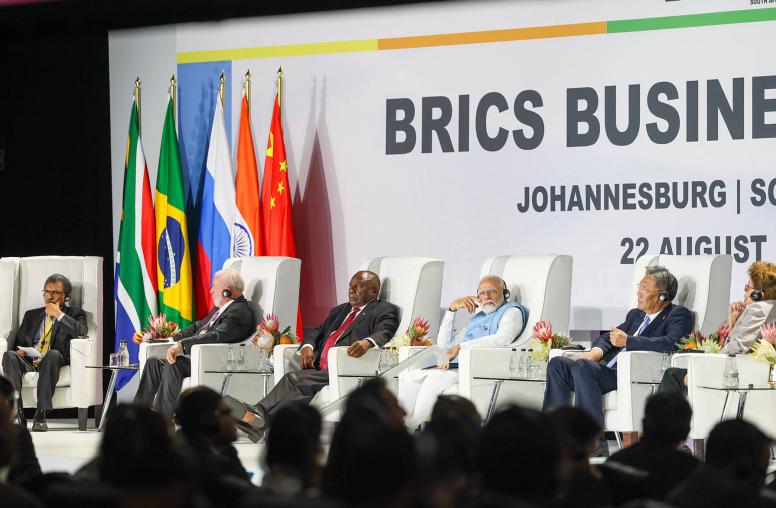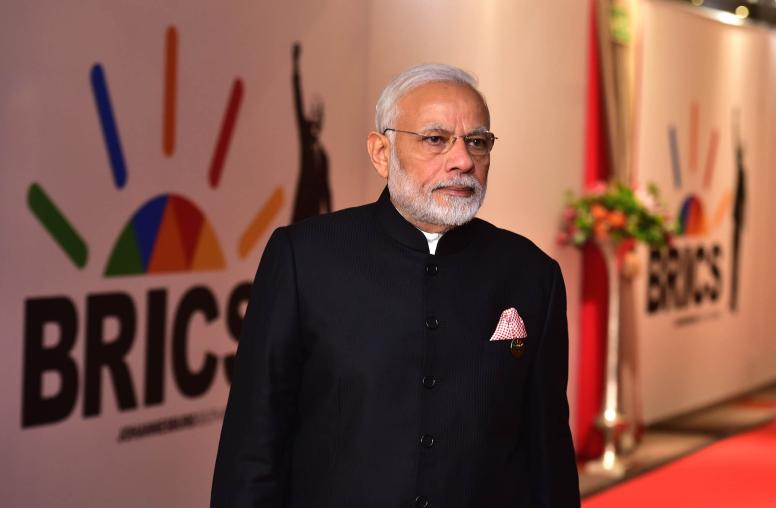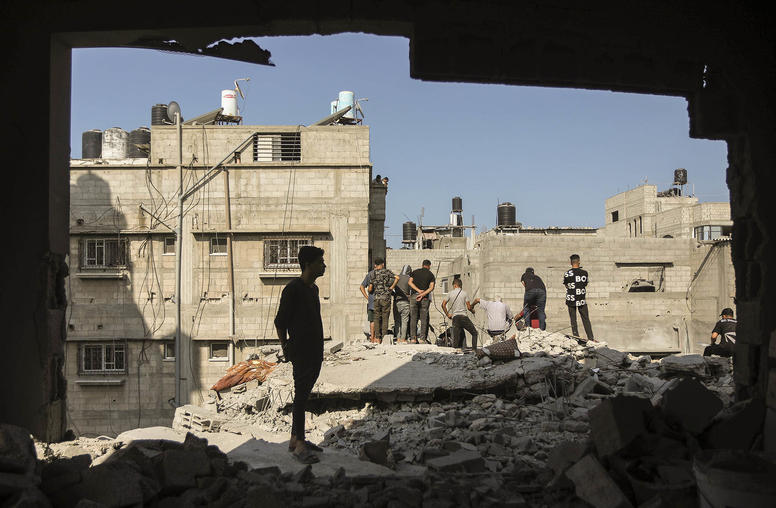Sameer Lalwani on the G20 Summit
At the G20 summit, the United States should focus on engaging with the Global South. “A lot of these countries are worried about bread-and-butter issues,” says USIP’s Sameer Lalwani. “In the absence of U.S. leadership at an institutional level … there’s going to be other actors that fill that vacuum.”
U.S. Institute of Peace experts discuss the latest foreign policy issues from around the world in On Peace, a brief weekly collaboration with SiriusXM's POTUS Channel 124.
Transcript
Laura Coates: Joining us now is Sameer Lawani, a senior expert on South Asia at the U.S. Institute of Peace. He's also a non-resident Senior Fellow with the Center for Strategic and Budgetary Assessments. He joins us now, Sameer, welcome, and good morning. How are you?
Sameer Lalwani: I'm doing well. How are you?
Laura Coates: I'm doing great. Thank you so much for asking. We're heading into the land of the G20. Right now, tell me a little bit about what you're watching for.
Sameer Lalwani: Sure. So, this is an annual convening of the world's leading economies in the E.U., that India is hosting for the first time. It's gathering about 85% of the world's global GDP, so it's fairly significant. They're going to try and tackle hard problems on economics and developments, climate finance, food, energy security, obviously, the war in Ukraine will be a hot topic of discussion, digital public infrastructure, so a lot’s on the table and a lot of opportunity to make some progress on global problems.
Laura Coates: And this might be many of these people have had a hard time interacting face to face because the COVID pandemic, and we've had, as you know, as you mentioned, the war in Ukraine and beyond the time of heightened global tensions, especially between the U.S. and China, Europe and Russia, India and China. So, some very interesting face to faces might be happening there.
Sameer Lalwani: That's right. I think there would have been an opportunity for President Biden and Xi Jinping to meet at the summit unfortunate sounds like Xi Jinping is not going to be attending and he's sending Premier Li instead. So that's a missed opportunity, really, for China, but there'll be plenty of other bilateral engagements. That'll be important between Europe and a lot of the developing world, the BRICS countries, obviously India planning to host, this is an opportunity for India to burnish its credentials as a bridging power between East and West between North and South. And I think I think there will still be a lot of productive bilateral meetings. I believe President Biden's having a separate bilat with Prime Minister Modi before the G20 as well.
Laura Coates: Is it surprising that China's not sending Xi Jinping?
Sameer Lalwani: Yeah, it's kind of surprising that he chose not to attend this one. I mean, there's China's you know, on the ropes in a way, they've been antagonizing a lot of the countries that have been that are going to be attending the G20. They just released this provocative map that elicited reactions from India, Indonesia and Malaysia, basically China's antagonizing a lot of countries and I think it's been probably slightly challenging for Xi to show up to this meeting. Nevertheless, you know, a statesman should be trying to bridge relationships with other countries and particularly with the United States, and he has been trying to communicate with China and put in guardrails in this competition. And just seems like Xi Jinping is not interested in that, which is, again, a big, big risk for China.
Laura Coates: And what is the nature of the cold relationship and the tension between China and India?
Sameer Lalwani: This stems from a 2020 border clash where China mobilized 10s of 1000s of troops on the border and occupied territories that were disputed. And it resulted in the first deaths on that border in over 50 years and since then, relations have been really frosty. Now, India was trying to reach out to China obviously invited Xi Jinping to this event, it looked like tensions were de-escalating, there was an opportunity for de-escalation on the border as well, but China released this really antagonistic map that elicited protests from India and after those protests, it sounds like Xi Jinping decided not to attend the summit.
Laura Coates: When you look at what the role of you know, the United States ought to be in this G20 and what the concerns will be going forward, what do you see?
Sameer Lalwani: So I think for the United States, what's important here is to attend to the interests of a lot of the swing states and the Global South that are going to be attending the G20 Summit, the U.S. is really good at leading the G7, leading NATO, leading the OECD, the developed world countries, but there's a lot of issues that are being left out of the conversation that we need in order to bring along with the rest of the world, especially if we're in a competition with China on some of these issues. So economic security, climate, energy transitions, these are issues that are salient to these swing states, the middle powers and the Global South that the U.S. has been maybe not as well credentialled on and so this is an opportunity for President Biden to make common cause with them and to demonstrate the U.S. is leading on these issues as well.
Laura Coates: So, the more developed countries are aligned with the U.S. when it comes to the backing in Ukraine or maybe competing with China, but are many of the middle powers, if you're talking about the developing world are they in which is, by the way, where majority of the population the world lives, are they skeptical as to those ideas?
Sameer Lalwani: Yeah, you know, the war in Ukraine, obviously, NATO and the United States have taken the stand in defense of Ukraine against Russia on a principle of sovereignty and territorial defense, and the rules-based order. And those are great ideas in principle, but you can't eat them. And a lot of the Global South has been facing the consequences of the sanctions on Ukraine and the war in Ukraine, due to energy prices and inflation, you know, for a while supply chains are all tied up and that was limiting through access to food security. So, a lot of these countries are worried about bread-and-butter issues, and they're concerned with the United States, possibly, you know, contributing to them. And now, obviously, that's not the case, but it's, it's important for the United States to have a clear message of who's been the disruptive power in the global order, and who's trying to shore it up. And I think that's an opportunity for the United States to lead on also on climate, right, we've had a really tough year when it comes to climate crises, certainly in the United States, but all around the world. And so, a lot of these countries are at the receiving end of that with populations that are vulnerable, facing migration challenges, sea levels rising and so this is an area where the United States again, is trying to lead but it's necessarily not being heard as well. And so, the G20 is a forum where the U.S. can reach and connect directly with the leaders of all these countries.
Laura Coates: Where did the BRICS come in, B-R-I-C-S?
Sameer Lalwani: Yeah, BRICS is Brazil, Russia, India, China and South Africa and they just had their meeting last week. They announced the inclusion of a number of new members, many of them are friends of the United States and so it is, in a way, you could say, a competitive order that is being developed and led not just by China, but China is certainly at the helm of it. India is a party to that too, and a leader of that as well, but it shows that in the absence of U.S. leaders in the leadership and institutional level light forms like the G20 or like the UN, there's going to be other actors that fill that vacuum and those actors may sort of have interest that are inimical to U.S. interests, particularly if Russia and China have a leadership role there. So, it's imperative for the United States to lead any institutions that it has developed like the G20.
Laura Coates: Really important to hear this this great conversation. Thank you for joining us so much, Sameer Lalwani, I appreciate you getting us up to speed on what's coming ahead of the G20.
Sameer Lalwani: Thanks for having me on.



